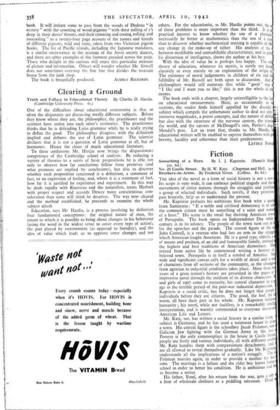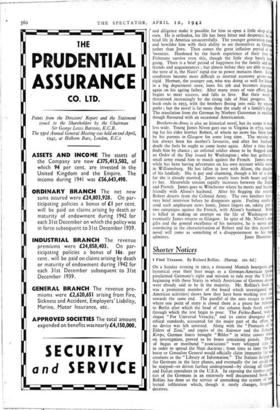Fiction
Something of a Hero. By I. J. Kapstein. (Hamish H los. 6d.)
THE idea of the novel as a form of social history is not a new Its scope is very wide, it can embrace political tragedy and the movements of entire nations through the struggles and probl a group of selected individuals. Such novels, if they penetrate past honestly, he:p us to understand the present. Mr. Kapstein prefaces his ambitious first book with a quo from Santayana : "If a noble and civilised democracy is to su the common citizen must be something of a saint and some of a hero." His scene is the small but thriving American tour of Persepolis. The book opens on Independence Day while century is in its infancy. The people of the town turn out in for the speeches and the parade. The central figure of the n John Cantrell, is a veteran who had lost an arm in the strugg which American fought American. He is a good type, elderly, a of means and position, of an old and honourable family, imbued the highest and best traditions of American democracy. Ha retired from active life he commenced writing a history 01 beloved town. Persepolis is in itself a symbol of America. So wide and significant canvas calls for a wealth of detail and a Va, of characters from all sections of the community, as the change from agrarian to industrial conditions takes place. More than P. years of a great nation's history are presented in the pages 01 impressive novel through the medium of its diverse characters. and girls of 1907 come to maturity, his central character to a age in the terrible period of the post-war industrial depression. Kapstein is a social critic, but he does not forget that people individuals before they are citizens. The good, the bad, the warm, all have their part in his whole. Mr. Kapstein belies humanity ; his novel, while not faultless, is a remarkably inte interpretation, and is warmly commended to everyone interest American Life and Letters.
Mr. Katz, too, has written a social history in a similar form. subject is Germany, and he has used a tenement house in pl a town. His central figure is the schoolboy Jacob Fishman, son Galician Jew fighting - with the German Army in the last Poverty is the only commonplace in the house in Castle Stree people are lively and various individuals, all with different probl Mr. Katz handles them with compassionate detachment, and are all allowed to reveal themselves gradually. Like Mr. KoPste understands all the implications of a nation's struggle. The Fishman marries again, in order to provide a mother for his sons. The marriage is a failure and the elder boy leaves home school in order to better his condition. He is ambitious and to become a writer. His father, Yosel, after his return from the war, gets a job a firm of wholesale clothiers as a peddling salesman. Hard
and diligence make it possible for him to open a little shop of own. He is orthodox, his life has been bitter and desperate, he tried life in America unsuccessfully. The younger generation p and bewilder him with their ability to see themselves as Ge rather than Jews. Then comes the great inflation period of 'twenties. Hardened by the harsh experience of their lives Fishmans survive even this, though the little shop barely k going. There is a brief period of happiness for the family and th friends and acquaintances ; but almost before they are able to re the taste of it, the Nazis' rapid rise to power menaces them. Li% conditions become more difficult as internal economy grows rigid. Herman, the younger son, who was doing so well for him in a big department store, loses his job and becomes depen again on his ageing father. After many years of vain effort, Ja begins to meet success, and falls in love. But their world threatened increasingly by the rising tide of Nazi progress. book ends in 1933, with the brothers fleeing into exile by sep paths ; but the novel is far more than the study of a family's pli The translation from the German by Norbert Guterman is excel though flavoured with an occasional Americanism.
Brothers-in-Arms is also an historical novel, but its scope is m less wide. Young James Niven goes out to Virginia in 1753, sear ing for his elder brother Robert, of whom no news has been h by his parents in Glasgow for some long time. The missing has always been his mother's favourite, and after her husb death she feels he ought to come home again. After a time j finds him by chance ; an enlisted soldier about to be flogged und an Order of the Day issued by Washington ; who has gathered small army round him to march against the French. James m while has been having adventures on his own account while stay in Williamsburg. He has fallen in love with Alison, the daugh of his landlady. She is gay and charming, though a bit of a m for she is already married. James nearly loses both heart and h t') her. Meanwhile tension rapidly increases between the Engl and French. James goes to Winchester where he meets and becom friendly with Alison's husband. After his flogging the resentf Robert deserts from the Colonial Army. The two brothers have very brief interview before he disappears again. Feeling unable send such unpleasant news home, James lingers on, taking pan two campaigns against the French, with Alison's husband. Ro is killed in making an attempt on the life of Washington eventually James returns to Glasgow. In spite of Mr. Niven's m gifts and the general excellence of his narrative, he is never q convincing in the characterisation of Robert and for this reason novel will come as something of a disappointment to his m



























 Previous page
Previous page